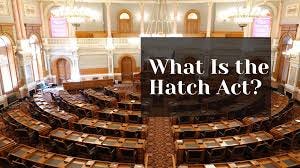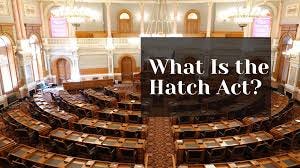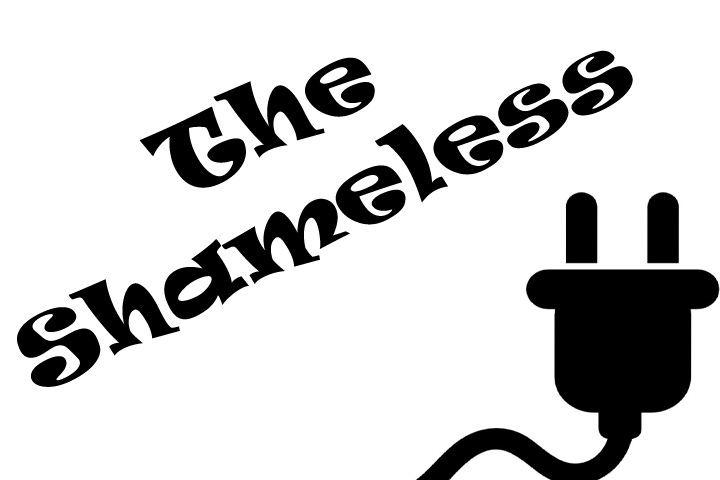A Guide to Understanding and Complying with the Hatch Act
Federal employees need to be very careful while at work.
Issue #322 Government May 18, 2023
Because many current and former government employees, including the former president of the United States and many of his aides and family members, at least one Congressman, and one or more justices of the Supreme Court are being accused and even indicted for civil and criminal acts, it is important to learn about one of the laws that federal employees must not break.
The Hatch Act was passed in 1939 to protect our electoral system from political interference by restricting partisan activities by executive branch employees while at work.
The History of the Hatch Act and Its Purpose
For over 80 years, the Hatch Act has been a pillar of American political life, regulating the conduct of certain federal employees and ensuring that the lines between partisan politics and government service remain clear. Its core purpose is to promote the integrity of our democracy by preventing federal civil servants from engaging in partisan political activity. The Hatch Act exists to protect public trust in government institutions and to ensure that taxpayer resources are not co-opted for political gain.
Please make sure to view and act on the important information at the end of this article to help support “We Are Speaking.” Thank you!
What activities are prohibited under the Hatch Act?
The Hatch Act of 1939 prohibits federal employees from engaging in certain political activities that may undermine the fair and impartial operation of the government. Some of the prohibited activities include actively participating in political campaigns, soliciting or receiving political contributions, and using one's official position to influence an election outcome. The prohibition extends to both on-duty and off-duty conduct, empowering the law to uphold a nonpartisan work environment free from political influence. However, it's important to note that there are certain exceptions where employees are allowed to engage in political activities, such as voting, expressing personal opinions, and running for a non-partisan office.
Instances when politicians have broken the Hatch Act
Although violations of the Hatch Act are rare, there have been instances where politicians have broken the law. In 2019, a video showed White House counselor Kellyanne Conway advocating for a Senate candidate during an interview at the White House. Similarly, in 2018, former senior advisor to President Obama, David Simas, was found to have violated the Hatch Act.
The Hatch Act serves to maintain the integrity of our government and ensure that politicians serve the public, not their own political interests.
How does the Hatch Act protect citizens from government abuse?
The Hatch Act protects citizens by restricting the political activities of federal employees, whether they work in the executive branch or for agencies such as the FBI or the postal service.
This law aims to prevent government workers from using their positions to promote political candidates or parties, ensuring that civil servants remain loyal to their duties and impartial in their service to the public.
While employees are still entitled to their political beliefs and private activities, the Hatch Act ensures that government workers are accountable to the people they represent, and it keeps government abuse at bay.
Are there any loopholes in the Hatch Act?
While the Act aims to ensure that government workers remain neutral in their political standings, there are still potential loopholes that individuals may exploit. For example, those who work in a screening role for government candidates may become privy to sensitive information that could influence their personal political views.
Moreover, it is not unheard of for employees to dodge the constraints of the Act by labeling their political activity as an expression of free speech.
Consequences for breaking the Hatch Act
The consequences for breaking the Hatch Act can range from being reprimanded to losing your job. In some cases you can face criminal charges.
Did you learn anything new about the Hatch Act?
Let us know in the Substack Notes feature.
You can always leave any questions in the comments or email us.
This article is free to access for 7 days after publication. Please consider becoming a paid subscriber for $5/month or less to access all of the articles and other benefits.
This is your chance to support everything Keith and Pam do. We appreciate you!
Purchase and download your copy of the “Branding And Marketing For The Rest Of Us” eBook for Independent Authors and Creative and Solo Professionals and other valuable eBooks.
Enroll in one of the 6-course bundles designed especially for you: “Author and Book Marketing” and/or “Essential Creative Marketing.”
Purchase your copies of “Detroit Stories Quarterly” issues.
What else do Keith and Pam do?
Where else can you find us?
Click the link below to learn everything you need to know and review everything we offer for independent writers and creative and solo professionals.








